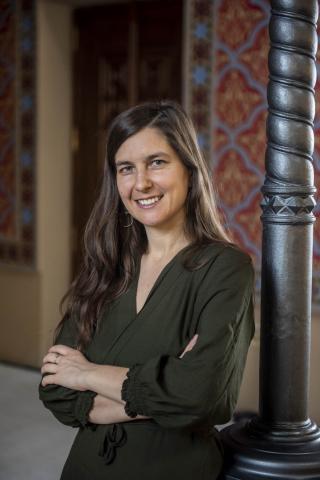A few years ago, the Centropa Professional Advisory Committee was formed in Hungary, consisting of three teachers who had been connected to Centropa for quite some time. It was customary at Centropa's teacher training sessions for veteran/experienced teachers to present their own ideas and lesson plans on how to integrate Centropa materials into education. In recent years, at Centropa Hungary our goal was to renew the Hungarian educational programs and materials of Centropa, including the teacher training seminars.
In addition to the teachers from the Professional Advisory Committee, three educators who had been particularly active in recent years and had volunteered extensively to assist in our work also joined the professional team. Thus, a system was established with this team of six teachers to collectively plan each teacher training program. This process involves creating an outline of the program, which we then discuss together, supplement with additional ideas, finalize, and divide tasks among ourselves. Therefore 8 of us co-facilitate the training seminars.
Regarding the HerStories teacher training seminar, we contemplated how to assist participants in getting closer to the women’s stories, enabling them to create their own lesson plans. Only two Centropa films are associated with the stories that we could screen, which usually helps participants connect to the narratives. Over the years, teachers had primarily developed new lesson plans related to films during our training sessions - therefore we had to come up with something different this time.
Before the seminar, participants were assigned the mandatory task of reading the short summaries of all seven stories available on the HerStories website in Hungarian. We anticipated that even if they completed this task, they wouldn't fully remember them, and likely the stories would get mixed up since there is a lot of information in them. Hence, the idea arose to conduct workshops in seven small groups, each focusing on the story of one woman, facilitated by one of us (six teachers and myself), with 4-5 participants in each group. These workshops were planned to last for 45 minutes, aiming for each group to get to know at least one life story closer and to present their work to each other in some way afterward. Each of us facilitators chose different methods to process the life story of each woman that could potentially be used by teachers in the classroom as well: inspired by Lisa Pinhas' blouse, one group created their own T-shirt adorned with their chosen quotes, for Irena Wygodzka's story, a detective game was developed based on the Mystery method, Vera's life stages were depicted in still images by the participants, etc. These workshops were so successful that the ideas developed were later used in the student workshops as well, and these workshop plans were uploaded to the HerStories and Centropa websites as lesson plans.
Following the workshops, the standard program of all our teacher training sessions followed: creating lesson plans in groups. Uniquely, we conducted random groupings, whereas in previous trainings, participants could voluntarily join a group based on a topic idea. During our preparatory meeting with the professional team, we decided collectively to try this new method this time, and we believe it worked really well.
We designated a member of the professional team as a facilitator for the newer groups as well, ensuring that the collaborative efforts were coordinated and unified by an experienced Centropa educator at all times. This facilitator serves occasionally as the catalyst or supporter for emerging ideas and transforming them into lesson plans when needed. The facilitators were somewhat prepared for the group work process in advance, but the emphasis was on brainstorming and cooperation together with the participants. In one group, we discussed, reviewed, and supplemented the student exercises that had been created for the website, while the other groups worked through a life story or theme. In total, we allocated an hour and a half for group work during this training, knowing that it might not be sufficient for all groups to finish, but we didn't want to leave out any other important program elements from the training. Thus, although the teachers presented the results of the group work to each other on the last day of the training, we also scheduled a Zoom meeting for January, where we would meet online again, and by then, those who needed more time to work after the training to finalize their lesson plans could present the final versions.
The experiences of recent years indicate that it is beneficial to have a follow-up online meeting for every teacher training a few weeks or even months later. After the HerStories seminar, the goal was for the groups to finish the final version of their lesson plans, suitable for uploading to the website, by the time of the Zoom meeting. In our most recent training in March, we allocated much more time for group work, with the aim that by the last day, each group would have their ideas finalized and ready for uploading. This goal was successfully achieved. Therefore, since our aim is not only to expand the repository of lesson plans available on the website but also to ensure that as many ideas as possible from Centropa's materials and developed lesson plans are incorporated into education, after the March training, we left 2 and a half months for the teachers to try out the lesson plans or at least part of them. We will meet again at the end of May, where they will share their experiences of implementing the plans.
We strive to provide frameworks for educational work that facilitate teachers getting as close as possible to Centropa's stories, films, and photos so that they are motivated and prepared to incorporate them into their lessons. Moreover, during the follow-up reunion, they are able to connect with each other and with us, share their experiences, inspiring each other in their work.
